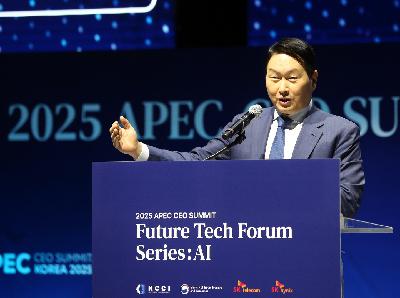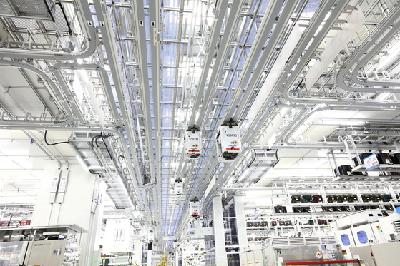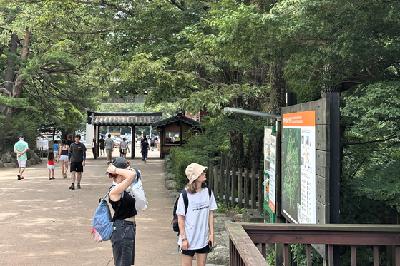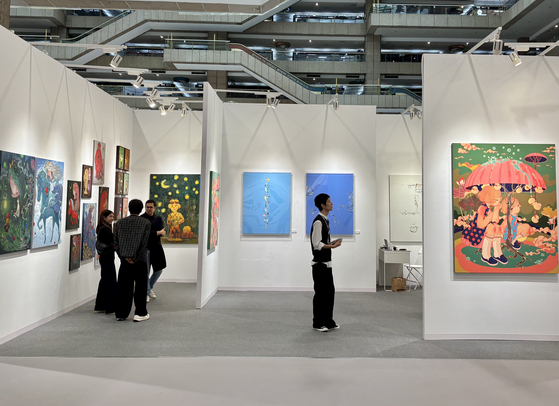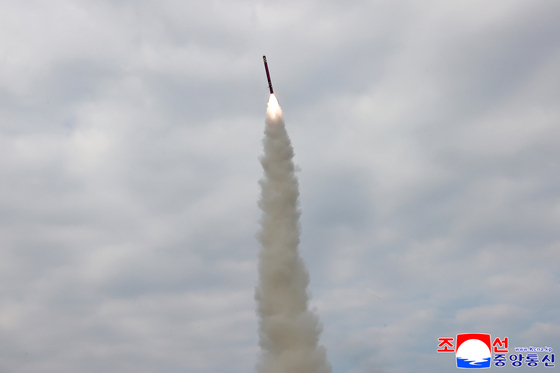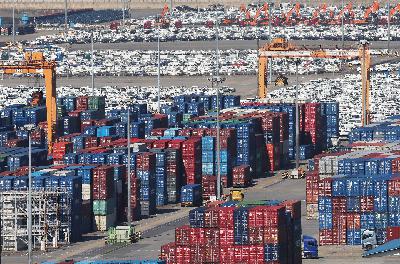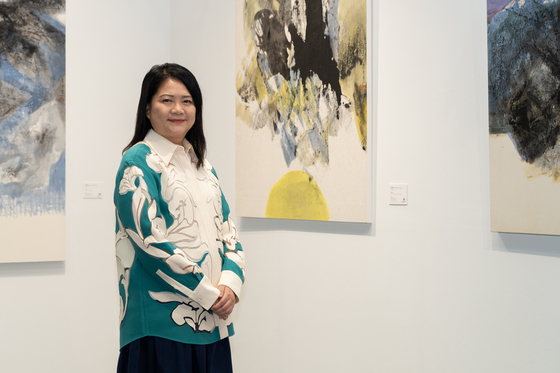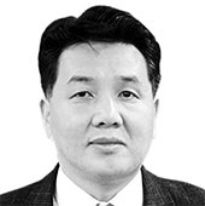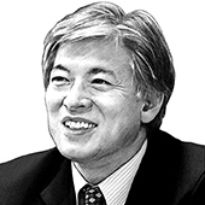From SK to OpenAI and AWS, global firms tout AI collaboration at APEC CEO Summit
Update: 2025-10-28
Description
This article is by Lee Jae-lim and read by an artificial voice.
GYEONGJU, North Gyeongsang - Korea is rapidly emerging as an AI hub in the Asia-Pacific region, powered by its leading chipmakers and expanding network of data centers. Global players such as OpenAI and Amazon Web Services (AWS) are deepening investments in AI infrastructure projects aimed at reinforcing the region's technological leadership, according to global leaders gathered at the Asia-Pacific Economic Cooperation (APEC) CEO Summit.
Speaking at the Future Tech Forum held under the APEC summit at Gyeongju Expo Park in North Gyeongsang on Tuesday, SK Group Chairman Chey Tae-won said Korea could serve as a testbed for resolving bottlenecks in global AI infrastructure - a key foundation for technological advances currently dominated by the United States and China.
"Both the United States and China, along with major tech giants, are pouring enormous sums into AI - far beyond what most other nations or companies can match," Chey remarked. "What we once thought were large-scale investments are dwarfed by theirs, adding one, two, even three more zeros."
Chey noted that AI development has evolved into a race defined by speed and scale, widening the gap between nations advancing in AI and those falling behind.
"However, this push for independence does not mean isolating ourselves from global players," he continued. "No country can achieve 100 percent self-sufficiency in AI. Korea's approach aims for both technological self-reliance and trusted global cooperation."
Such cooperation took center stage during the forum, with Senior Presidential Secretary for AI and Future Planning Ha Jung-woo, AWS CEO Matt Garman, and OpenAI Korea General Manager Kim Kyung-hoon agreeing that building a "full-stack" AI ecosystem is impossible for any one nation alone.
"Together with SK Group, we began discussions about a year ago on how to bring a truly Korean AI data center to life," Garman said.
He emphasized that developing an AI stack demands global collaboration, noting that no single country can supply every component on its own. He explained that semiconductor and memory technologies are driven by Korea and Taiwan's TSMC, while cloud and networking capabilities are led by the United States.
"That said, local infrastructure also brings significant advantages - and that's exactly what we're partnering on," he added.
AWS and SK Group are jointly investing $5 billion to build a large-scale AI data center in Ulsan. Meanwhile, Samsung Electronics and SK hynix have each signed agreements with OpenAI to supply memory chips for the ChatGPT maker's $500 billion Stargate project, which also includes the construction of next-generation data centers along Korea's southern and western coasts.
"Together with the Ministry of Science and ICT, SK and Samsung are exploring collaboration on developing data centers in southern Korea," Kim said. "We expect these projects will not only advance infrastructure and operations but also strengthen Korea's sovereign AI ecosystem."
In September, Korea also signed a partnership with BlackRock, the U.S.-based asset management giant, to jointly invest in AI and renewable energy infrastructure.
The government is substantially ramping up its AI budget, tripling next year's allocation to 10.1 trillion won ($7 billion). Plans include the purchase of 15,000 GPUs to expand national computing capacity, in addition to 10,000 units secured this year through a supplementary budget and existing holdings. Within two years, the state aims to control 35,000 GPUs, while private companies are expected to acquire an additional 15,000, bringing Korea's total AI computing infrastructure to 50,000 GPUs.
"Ultimately, the competitiveness of sovereign AI depends on how well its ecosystem develops - and at the foundation of that ecosystem lies infrastructure," Ha said. "The key is how effectively these technologies are applied to create value across sectors."
The presidential secretary...
GYEONGJU, North Gyeongsang - Korea is rapidly emerging as an AI hub in the Asia-Pacific region, powered by its leading chipmakers and expanding network of data centers. Global players such as OpenAI and Amazon Web Services (AWS) are deepening investments in AI infrastructure projects aimed at reinforcing the region's technological leadership, according to global leaders gathered at the Asia-Pacific Economic Cooperation (APEC) CEO Summit.
Speaking at the Future Tech Forum held under the APEC summit at Gyeongju Expo Park in North Gyeongsang on Tuesday, SK Group Chairman Chey Tae-won said Korea could serve as a testbed for resolving bottlenecks in global AI infrastructure - a key foundation for technological advances currently dominated by the United States and China.
"Both the United States and China, along with major tech giants, are pouring enormous sums into AI - far beyond what most other nations or companies can match," Chey remarked. "What we once thought were large-scale investments are dwarfed by theirs, adding one, two, even three more zeros."
Chey noted that AI development has evolved into a race defined by speed and scale, widening the gap between nations advancing in AI and those falling behind.
"However, this push for independence does not mean isolating ourselves from global players," he continued. "No country can achieve 100 percent self-sufficiency in AI. Korea's approach aims for both technological self-reliance and trusted global cooperation."
Such cooperation took center stage during the forum, with Senior Presidential Secretary for AI and Future Planning Ha Jung-woo, AWS CEO Matt Garman, and OpenAI Korea General Manager Kim Kyung-hoon agreeing that building a "full-stack" AI ecosystem is impossible for any one nation alone.
"Together with SK Group, we began discussions about a year ago on how to bring a truly Korean AI data center to life," Garman said.
He emphasized that developing an AI stack demands global collaboration, noting that no single country can supply every component on its own. He explained that semiconductor and memory technologies are driven by Korea and Taiwan's TSMC, while cloud and networking capabilities are led by the United States.
"That said, local infrastructure also brings significant advantages - and that's exactly what we're partnering on," he added.
AWS and SK Group are jointly investing $5 billion to build a large-scale AI data center in Ulsan. Meanwhile, Samsung Electronics and SK hynix have each signed agreements with OpenAI to supply memory chips for the ChatGPT maker's $500 billion Stargate project, which also includes the construction of next-generation data centers along Korea's southern and western coasts.
"Together with the Ministry of Science and ICT, SK and Samsung are exploring collaboration on developing data centers in southern Korea," Kim said. "We expect these projects will not only advance infrastructure and operations but also strengthen Korea's sovereign AI ecosystem."
In September, Korea also signed a partnership with BlackRock, the U.S.-based asset management giant, to jointly invest in AI and renewable energy infrastructure.
The government is substantially ramping up its AI budget, tripling next year's allocation to 10.1 trillion won ($7 billion). Plans include the purchase of 15,000 GPUs to expand national computing capacity, in addition to 10,000 units secured this year through a supplementary budget and existing holdings. Within two years, the state aims to control 35,000 GPUs, while private companies are expected to acquire an additional 15,000, bringing Korea's total AI computing infrastructure to 50,000 GPUs.
"Ultimately, the competitiveness of sovereign AI depends on how well its ecosystem develops - and at the foundation of that ecosystem lies infrastructure," Ha said. "The key is how effectively these technologies are applied to create value across sectors."
The presidential secretary...
Comments
In Channel

